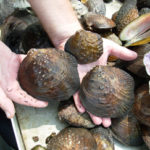Chairperson: Don Hubbs, Tennessee Wildlife Resources Agency

MICRA formed a Freshwater Mussel Committee under the leadership of Al Buchanan, Missouri Department of Conservation in 1996. Under Buchanan’s leadership organizational meetings were held reaching out to freshwater mussel experts, enthusiasts, and consumptive users nationwide. The first order of business of MICRA’s Freshwater Mussel Committee was to initiate discussions related to development of a Strategic Action Plan for the conservation and management of freshwater mussels within the Mississippi River Basin.
These discussions and meetings made it evident that a broader, nationwide approach was needed. As a result, MICRA’s Freshwater Mussel Committee provided the stimulus for formation of the Freshwater Mollusk Conservation Society in 1998. Later that year the Society published it’s “National Strategy for the Conservation of Native Freshwater Mussels” in the Journal of Shellfish Research, 1(5):1419-1428. MICRA members participated in the development of this “National Strategy”, and it now serves as a guide for MICRA’s own regional management of freshwater mussels.
In 1998 MICRA’s Freshwater Mussel Committee was renamed the Native Mussel Committee, and it now not only serves the needs of MICRA, but also serves as an ad hoc regional advisory group to the larger Freshwater Mollusk Conservation Society. MICRA’s most recent focus has been on standardizing state regulations related to the commercial harvest of freshwater mussels. The Freshwater Mollusk Conservation Society’s Web Page can be found at: http://molluskconservation.org.

